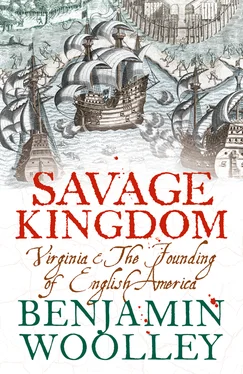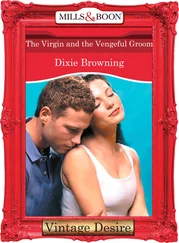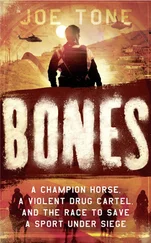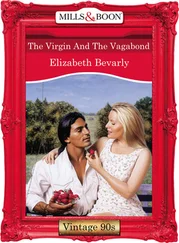Parahunt now placed his own gown upon Newport’s shoulders, which the English understood to mean he was offering a ‘league of friendship’. Putting his hand on his heart, he said to Newport, ‘ Wingapoh chemuze ,’ Archer taking this to be the kindest of all salutations in the Indian language.
It was now late, and the English said they needed to return to their ship. They were sent on their way with six of Parahunt’s men, and the English left behind one of their own as a gesture of trust. Rather than return directly to the shallop, they rowed 3 miles up the river, where they found what the Indians had warned them of: a great cataract that was clearly impassable. Even this far inland, the river was still tidal, rising 4 foot between high and low tide, and suitable for vessels with a draft less than 6 foot. But beyond, the only way forward was on foot.
‘Having viewed this place between content and grief,’ Archer concluded, ‘we left it for this night, determining the next day to fit ourselves for a march by land.’
The guides who were with them were sent home, except one, called Navirans, who asked if he could sleep on board the shallop with the English. Newport agreed, a gesture of faith rewarded with the safe return of the Englishman left at Powhatan’s Tower, ‘who coming told us of his entertainment, how they had prepared mats for him to lie on, gave him store of victuals, and made as much [of] him as could be’. A close relationship developed between Navirans and the English, particularly with Archer. The Indian ‘had learned me so much of the language,’ Archer wrote, ‘and was so excellently ingenious in signing out his meaning, that I could make him understand me, and perceive him also well-nigh in anything’.
The following day, Whitsunday, 24 May, Newport decided to return some of the hospitality the English had received. His men built a fire on the shore, and they boiled two pieces of pork and some peas, the best that could be offered from their dwindling supplies. Newport invited the two chiefs to join him. Parahunt accepted, but Arrohateck excused himself on the grounds that he needed to return to his village.
As Arrohateck was about to leave, the convivial mood abruptly changed. An English mariner reported that two ‘bullet bags’ containing ‘shot and divers trucking toys’ had gone missing.
The chiefs acted quickly and decisively, ordering the immediate return of all stolen property. The speed with which the items reappeared was impressive evidence of the chiefs’ authority. Everything that had gone was now laid at Newport’s feet, including a knife the English had not even realized was missing. ‘So Captain Newport gave thanks to the kings and rewarded the thieves with the same toys they had stolen, but kept the bullets.’ Newport also warned that the custom in England was to punish theft with death.
Good relations apparently restored, the Powhatan weroance sat down to the feast, ‘and we fed familiarly’, Archer reported, ‘without sitting in his state as before’. The relaxed atmosphere was helped by quantities of beer, aqua vitae (spirits) and sack (Spanish white wine). Alcoholic drinks were not part of the local diet, and this first exposure to some potent European brews had an unusually strong effect on Newport’s guest. This might explain why the chief fell into such an uninhibited mood, talking about the copper, iron and other rich and rare commodities to be found in the mountains beyond the waterfalls.
As the merrymaking was drawing to a close, Newport said he wanted to embark on a three-day expedition further inland to see if he could find these commodities. The chief, perhaps prompted by a sobering word whispered in his ear, suddenly fell silent. He got up to leave, promising only that he would rendezvous with the English later that day at the foot of the falls.
In the afternoon, the English rowed upriver. They found the Powhatan chief sitting on a bank next to the lower reaches of the cascading water.
At this point, the nameless Kind Consort who had appeared to the English at Weyanock approached in a canoe, continuing his mysterious knack of reappearing at significant moments of the English exploration. He told Newport’s men to ‘make a shout’. They were unsure why, but they did as they were asked and cried out. They assumed it was to welcome King Powhatan, though it may have been to acknowledge some other power that inhabited the falls, or paquacowng , as the Indians apparently called them. 17
Newport led a group across the rocks to talk to Parahunt. The expansiveness had evaporated. The chief ‘sought by all means to dissuade our captain from going any further’. It would be tedious travel, he claimed. Ahead lay the Monacan people, who were enemies, and liable to attack Powhatan guides if not the whole party, and even if they got past them, the Quirank mountains that lay beyond were difficult and dangerous, devoid of the food supplies they would need for a proper exploration. The Monacans ‘came down at the fall of the leaf’, he told Newport, and attacked his people’s villages. Newport offered five hundred English troops to fight alongside the Powhatan people upon the Monacans’ return, ‘which pleased the king much’.
To Archer’s surprise, Newport agreed not to proceed any further, ‘holding it much better to please the king, with whom and all of his command he had made so fair way, than to prosecute his own fancy or satisfy our requests’.
The weroance now departed, followed by all his men except Navirans, who accompanied the English to an ‘islet’ in the middle river, which stood before the falls. There, Newport announced that the river would henceforth be known as the James, and ordered the soldiers to erect a large cross, as they had done at Cape Henry. It bore the Latin inscription ‘Jacobus Rex. 1607’: King James 1607. As the cross rose into the sky, Navirans gave out a great cry. Newport was reassuring, explaining ‘that the two arms of the cross signified King Powhatan and himself, the fastening of it in the middest was their united league’. This explanation apparently ‘cheered Navirans not a little’.
The English prepared for their journey back down the river they had renamed the James, and Newport sent Navirans to invite ‘King Powhatan’ for a farewell meeting. The chief duly appeared with Navirans and his retinue on the river bank, and Newport rowed alone from the shallop to the shore, to present a gown and a hatchet as farewell gifts.
The mood had changed. The chief seemed angered by the appearance of the cross, casting its long evening shadow across the river’s sacred waters. Percy noted that the ‘savages’ now ‘murmured at our planting in the country’. Newport prompted Navirans to pass on the explanation that the cross symbolized peace. Parahunt appeared to be reassured, and, according to Navirans’s translation, rebuked his people: ‘Why should you be offended with them as long as they hurt you not, nor take anything away by force? They take but a little waste ground which doth you nor any of us any good.’ 18
With feelings of reassurance mixed with uncertainty, the English left and headed back for Jamestown. As night fell, they stopped at Arrohateck. The chief was ill, complaining that the ‘hot drinks’ the English had given him had made him sick. Newport confidently predicted that he would feel better in the morning, which was duly the case, and to celebrate his recovery, the chief ordered venison to be roasted for the visitors.
While they were there, some of the Arrohateck people offered to show the guests their homes and gardens. Passing among the houses, scattered around groves of tall trees, the English entered a world hidden from them by the diplomatic formalities experienced so far. This was the domain of women. While the men ‘fish, hunt, fowl, go to the wars’, the women kept the home and hearth, and tended the fields. They also raised and educated the children, shaved the men, foraged for fuel, chopped wood, spun flax, ground corn, baked bread, butchered meat, gathered medicinal herbs, healed the sick and mourned the dead, ‘which’, Smith observed, ‘is the cause that the women be very painful [i.e. burdened] and the men often idle’.
Читать дальше












